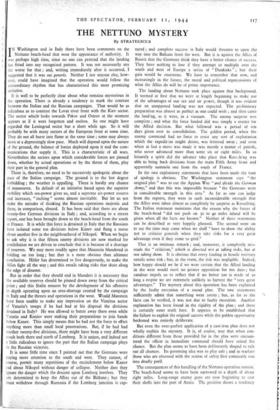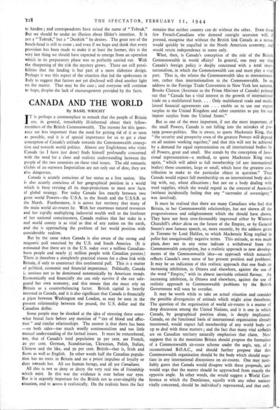THE NETTUNO MYSTERY
By STRATEGICUS TN Washington and in Italy there have been comments on the Nettuno beach-head that wear the appearance of authority. It was perhaps high time, since no one can pretend that the landing
has fitted into any recognised pattern. It was not necessarily any the worse for that ; and, writing immediately after it occurred, I suggested that it was sui genetic. Neither I nor anyone else, how- ever, could have imagined that the operation would follow the extraordinary rhythm that has characterised this most promising initiative.
It is well to be perfectly clear about what remains mysterious in the operation. There is already a tendency to mark the contrast between the Italian and the Russian campaigns. That would be as ridiculous as to contrast the Lovat river front with the Kiev sector. The sector which- looks towards Pskov and Ostrov at the moment appears as if it were forgotten and useless. So one might have regarded the Leningrad sector but a short while ago. So it will probably be with many sectors of the European front at some time.
They do not all burst into flame at the same time ; some may always move at a depressingly slow pace. Much will depend upon the nature of the ground, the balance of forces deployed upon it and the com- munications that supply it. This is a characteristic of all wars. Nevertheless the sectors upon which considerable forces are pinned down, whether by actual operations or by the threat of them, play their part in the general plan.
There is, therefore, no need to be excessively apologetic about the pace of the Italian campaign. The ground is to the last degree forbidding ; the weather is appalling. There is hardly any chance of manoeuvre. In default of an initiative based upon the superior mobility which sea-power gives us, and a supreme air-power assures and increases, " inching " seems almost inevitable. But let us not make the mistake of thinking the Russian operations majestic and these, in comparison, absurd. It has been said that there are about twenty-five German divisions in Italy ; and, according to a recent report, one has been brought down to the beach-head from the south 01 France. It is while this force is detained in Italy that the Russians have isolated some ten divisions below Kanev and flung a noose about another five in the neighbourhood of Nikopol. When we begin to ask why it is that fifteen enemy divisions are now marked for annihilation we are driven to conclude that it is because of a shortage of reserves. We may more readily agree that Manstein blundered in holding on too long ; but that is a more obvious than ultimate conclusion. Hitler has determined to live dangerously, to make the Allies fight all the way ; and this entails taking risks that skate along the edge of disaster.
But in order that they should end in blunders it is necessary that the available reserves should be pinned down away from the critical point ; and this Stalin ensures by the development of his offensive in depth operating upon an area-shortage created by the campaign In Italy and the threats and operations in the west. Would Manstein have been unable to make any impression on the Vinnitsa sector of Vatutin's troops if he had had at his disposal the divisions detained in Italy? He was allowed to batter away there even while Varutin and Koniev were making their preparations to join hands below 'Caney. This simply means that he had not the force to effect anything more than small local penetrations. But, if he had had another twenty-five divisions, there might have been a very different result both there and north of Lemberg. It is unjust, and indeed not a little ridiculous to ignore the part that the Italian campaign plays in the Russian victories.
It is some little time since I pointed out that the Germans were paying more attention to the south and west. They cannot, of course, permit many repetitions of the encirclement below Kanev aad about Nikopol without danger of collapse. Neither dare they ignore the danger which the descent upon Lemberg involves. They are determined to keep the Allies out of the Balkans ; but they must withdraw through Rumania if the Lemberg junction is cap- tured ; and complete success in Italy would threaten to open the way into the Balkans from the west. But it is against the Allies of Russia that the Germans think they have a better chance of success. They have nothing to lose if they attempt to multiply over the south and west of Europe a series of " Dunkirks " ; but their gain would be enormous. We have to remember that now, and increasingly in the future, the moral and political repercussions of what the Allies do will be of prime importance.
The landing about Nettuno took place against that background. It seemed at first that we were at length beginning to make use of the advantages of our sea and air power, though it was evident that anunopposed landing was not expected. The preliminary preparation was almost as perfect as one could wish ; and then came the landing, as it were, in a vacuum. The enemy surprise was complete ; and what the force landed did was simply a matter for the Allied decision. But what followed was a period of ten days given over to consolidation. The golden period, when the enemy command had no force to resist any sort of explouation which the expedit:on might desire, was frittered away ; and even when at last a move was made it was merely a matter of patrols, who never advanced more than some six or eight miles. In so leisurely a spirit did the advance take place that Kest,:lring was able to bring back divisions from the main Fifth Army front and apparently summon one from the south of France.
In the two explanatory statements that have been made the tone of apology is obvious. The Washington statement says "the original plan" was to cut the Appian Way "and divide the German Army," and that this was impossible because "the Germans were in considerable strength in this area." As far as one can judge from the reports, they were in such inconsiderable strength that the Allies were taken almost as completely by surprise as Kesselring. The Italian statement maintains that the reason why the forces of the beach-head "did not push on 30 to 40 miles inland will be given when all the facts are known." Neither of these statements can be described as very happily phrased. The second went on to say the time may come when we shall "have to show the ability not to criticise generals when they take risks for a very great advantage even if they come to grief."
That is an ominous remark ; and, moreover, it completely mis- reads the "criticism," which is directed not at taking risks, but at not taking them. It is obvious that every landing in hostile territory entails some risk ; but, in the event, the risk was negligible. Indeed,
how happy should we be if we were certain that the Allied landing in the west would meet no greater opposition for ten days ; but candour impels us to reflect that if no better use is made of so long a respite we are extremely unlikely to harvest the "very great advantages." The mystery about this operation has been explained by the faulty execution of a sound plan. The two statements sufficiently admit that something went astray ; but, as far as the facts can be verified, it was not due to faulty execution. Another explanation has been found in the rigidity of the plan ; and there is certainly some truth here. It appears to be established that the failure to exploit the original success while the golden opportunity beckoned was entirely deliberate.
But even the over-perfect application of a cast-iron plan does not wholly explain the mystery. It is, of coirse, true that when con- ditions different from those provided for in the plan were encoun- tered the officer in immediate command should have seized his chance. But the plan seems to have been deliberately shaped to rule out all chances. Its governing idea was to play safe ; and in warfare those who are obsessed with the notion of safety first commonly run into deadly peril.
The consequences of this handling of the Nettuno operation remain. The beach-head seems to have been narrowed to a depth of about eight miles. Long-range enemy guns are now beginning to cast their shells into the port of Anzio. The position shows a tendency to harden ; and correspondents have raised the name of "Tobruk." But we should be under no illusion about Hitler's intention. It is not a "Tobruk," but a " Dunkirk " he desires. The great test of the beach-head is still to come ; and even if we hope and think that every provision has been made to make it at least the former, this is the very last thing we should have expected to emerge from an operation which in its preparatory phase was so perfectly carried out. With the sharpening of the risk the mystery grows. There are still possi- bilities that the landing is but part of a more elaborate design. Perhaps it was this aspect of the situation that led the spokesman in Italy to suggest that factors not yet disclosed will shed another light on the matter. That may be the case ; and everyone will continue to hope, despite the lack of encouragement provided by the facts.



























 Previous page
Previous page